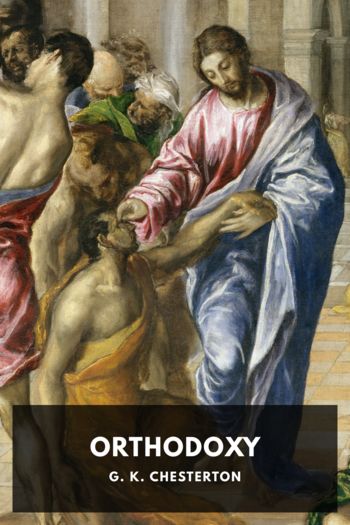Heretics - G. K. Chesterton (novels to improve english TXT) 📗

- Author: G. K. Chesterton
Book online «Heretics - G. K. Chesterton (novels to improve english TXT) 📗». Author G. K. Chesterton
He was not a great personality, because he thought so much about himself. And the case is stronger even than that. He was sometimes not even a great artist, because he thought so much about art. Any man with a vital knowledge of the human psychology ought to have the most profound suspicion of anybody who claims to be an artist, and talks a great deal about art. Art is a right and human thing, like walking or saying one’s prayers; but the moment it begins to be talked about very solemnly, a man may be fairly certain that the thing has come into a congestion and a kind of difficulty.
The artistic temperament is a disease that afflicts amateurs. It is a disease which arises from men not having sufficient power of expression to utter and get rid of the element of art in their being. It is healthful to every sane man to utter the art within him; it is essential to every sane man to get rid of the art within him at all costs. Artists of a large and wholesome vitality get rid of their art easily, as they breathe easily, or perspire easily. But in artists of less force, the thing becomes a pressure, and produces a definite pain, which is called the artistic temperament. Thus, very great artists are able to be ordinary men—men like Shakespeare or Browning. There are many real tragedies of the artistic temperament, tragedies of vanity or violence or fear. But the great tragedy of the artistic temperament is that it cannot produce any art.
Whistler could produce art; and in so far he was a great man. But he could not forget art; and in so far he was only a man with the artistic temperament. There can be no stronger manifestation of the man who is a really great artist than the fact that he can dismiss the subject of art; that he can, upon due occasion, wish art at the bottom of the sea. Similarly, we should always be much more inclined to trust a solicitor who did not talk about conveyancing over the nuts and wine. What we really desire of any man conducting any business is that the full force of an ordinary man should be put into that particular study. We do not desire that the full force of that study should be put into an ordinary man. We do not in the least wish that our particular lawsuit should pour its energy into our barrister’s games with his children, or rides on his bicycle, or meditations on the morning star. But we do, as a matter of fact, desire that his games with his children, and his rides on his bicycle, and his meditations on the morning star should pour something of their energy into our lawsuit. We do desire that if he has gained any especial lung development from the bicycle, or any bright and pleasing metaphors from the morning star, that they should be placed at our disposal in that particular forensic controversy. In a word, we are very glad that he is an ordinary man, since that may help him to be an exceptional lawyer.
Whistler never ceased to be an artist. As Mr. Max Beerbohm pointed out in one of his extraordinarily sensible and sincere critiques, Whistler really regarded Whistler as his greatest work of art. The white lock, the single eyeglass, the remarkable hat—these were much dearer to him than any nocturnes or arrangements that he ever threw off. He could throw off the nocturnes; for some mysterious reason he could not throw off the hat. He never threw off from himself that disproportionate accumulation of aestheticism which is the burden of the amateur.
It need hardly be said that this is the real explanation of the thing which has puzzled so many dilettante critics, the problem of the extreme ordinariness of the behaviour of so many great geniuses in history. Their behaviour was so ordinary that it was not recorded; hence it was so ordinary that it seemed mysterious. Hence people say that Bacon wrote Shakespeare. The modern artistic temperament cannot understand how a man who could write such lyrics as Shakespeare wrote, could be as keen as Shakespeare was on business transactions in a little town in Warwickshire. The explanation is simple enough; it is that Shakespeare had a real lyrical impulse, wrote a real lyric, and so got rid of the impulse and went about his business. Being an artist did not prevent him from being an ordinary man, any more than being a sleeper at night or being a diner at dinner prevented him from being an ordinary man.
All very great teachers and leaders have had this habit of assuming their point of view to be one which was human and casual, one which would readily appeal to every passing man. If a man is genuinely superior to his fellows the first thing that he believes in is the equality of man. We can see this, for instance, in that strange and innocent rationality with which Christ addressed any motley crowd that happened to stand about Him. “What man of you having a hundred sheep, and losing one, would not leave the ninety and nine in the wilderness, and go after that which was lost?” Or, again, “What man of you if his son ask for bread will he give him a stone, or if he ask for a fish will he give him a serpent?” This plainness, this almost prosaic camaraderie, is the note of all very great minds.
To very great minds the things on which men agree are so immeasurably more important than the things on which they differ, that the latter, for all practical purposes, disappear. They have too much in them of an ancient laughter even to endure to discuss the difference between the hats of two men who were both born of a woman, or between





Comments (0)